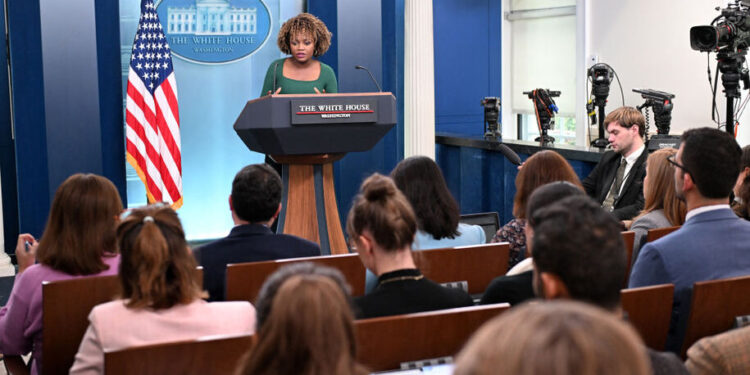Donald Trump Jr. spilled on his echo chamber podcast that his president-elect father might make space in the White House Briefing Room for his favorite podcast bros.
“I wonder now, as your father is assembling his team, as maybe [Trump’s national press secretary] Karoline Leavitt is looking at the new press briefing room chart, maybe it’s time to reorder that chart and maybe take away some people’s seats,” Michael Knowles cohost on “Triggered with Donald Trump,” asked.
“I was on the plane with my father … and we were talking about the podcast world and some of our friends and [Joe] Rogan and guys like you,” Don Jr. said, explaining their plan to add podcast hosts, influencers, and other nontraditional media sources to the Briefing Room.
Knowing that the potential move would mean the incoming administration would have to revoke some traditional media press passes, he added, “That’s going to blow up some heads.”
In addition to Rogan, Trump’s beloved mouthpieces in the podcast manosphere include the likes of Barstool Sports’ Dave Portnoy, Megyn Kelly, and Adin Ross, whose influence undoubtedly helped Trump in his 2024 election win.
However, the question of how these very blatantly pro-Trump media personalities will cover the MAGA founder looms overhead.
While podcasts have beefed up their production quality and even typically have journalists behind the scenes to carry out their news gathering, some of the journalistic standards held by traditional newsrooms may not exist in the podcast or influencer realm.
It’s important to note that journalistic standards vary from newsroom to newsroom, and that there are no laws in place to hold media to a certain standard—thank the First Amendment for this freedom.
Overall, this protects media outlets from any laws a sitting president might impose because they, well, don’t like how an outlet portrays them.
However, as the line between factual reporting and opinionated entertainment shows has blurred in the fast and dirty digital realm, this makes way for influencers and podcast personalities with no prior journalistic experience to lead the national (or international) conversation.
While the pros and cons of the new wave of journalism is widely debated, the defenses these new establishments have to protect themselves from nefarious outside sources has been brought to light.
In September, one media company that housed right-wing influencers—including Tim Pool, Dave Rubin, and Benny Johnson—was found to have been unknowingly funded by a Russian influence operation.
According to an indictment obtained by the Associated Press, these influencers were taking in funding from Russian operatives to churn out English-language content that was “often consistent” with Russia’s “interest in amplifying U.S. domestic divisions in order to weaken U.S. opposition” to Russia. This included pushing thoughts that were sympathetic to the Kremlin amid the Russia-Ukraine war.
The U.S. Department of Justice alleged the influencers involved in this case were unaware of where the funding was coming from, and did not point fault at the hosts. However, the situation opens the dialogue for how susceptible new age media might be to outside influence.
As for how the White House will handle these potential changes, Trump has pushed buttons in the Briefing Room before. During his first presidency, Trump banned CNN’s Jim Acosta from the Briefing Room. He also took aim at BBC and The New York Times, barring them from the room amid his “fake news” tirade.
The White House later backed down on their ban, allowing press members like Acosta back into the room.
Two years later, the Trump administration attempted to sully the White House’s relationship with media again by enacting new rules for the press’ “hard pass,” which allows members of the press speedy access to the White House.
New term, new circus.


